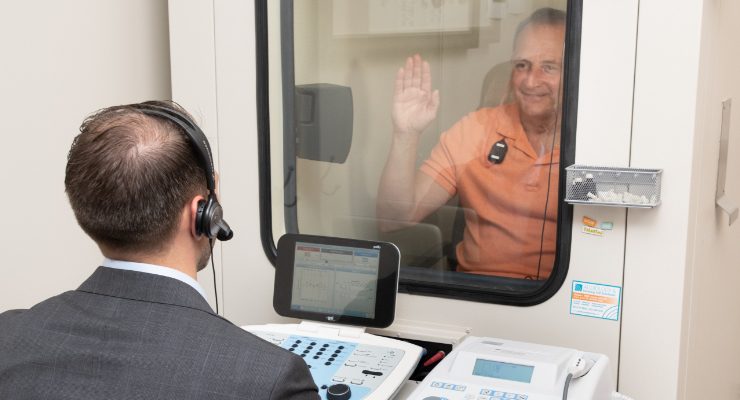
Hearing aids are often the first choice when it comes to treating hearing loss, but when these devices don’t do the trick alone, cochlear implants become an option. With so many differences between hearing aids and cochlear implants – from their features and benefits, as well as individual differences between each case. Learn more here as we take an in-depth look at the different treatments, and why hearing aids are typically recommended for mild-to-profound hearing loss.
Hearing Aids
Hearing aids are the go-to treatment option for hearing loss. These electronic devices, worn either behind or in the ear, amplify sounds so they can be heard more clearly. There are many sizes, styles and levels of hearing aids suitable for mild to profound cases of hearing loss. There are three main styles of hearing aids like behind the ear (BTE), in the ear (ITE) and in the canal (ITC). As technology has advanced further, hearing aids now also come equipped with Bluetooth connectivity and directional microphones which enable their users to hear better in noisy environments.
Cochlear Implants
In contrast with hearing aids which amplify sound, cochlear implants bypass damaged parts of the inner ear and directly stimulate auditory nerve, providing access to sound even for individuals who might otherwise not hear. They are surgically implanted under the skin behind the ear with an external component picking up sound waves before sending them directly into the implant through wire. Cochlear implants act like microphones and processors by transmitting audio directly into your brain – providing sound signals straight into the brain.
Ease of Use
Hearing aids are easier to use than cochlear implants due to being adjustable easily by an audiologist to ensure maximum performance. Cochlear implants must first be surgically implanted prior to being adjusted using computer programs in order to achieve maximum hearing performance.
Technology
Hearing aids come in all sorts of styles and levels of technology. Digital hearing aids offering advanced features like noise reduction and feedback cancellation. Cochlear implants have also advanced over the years to offer features such as directional microphones and telecoils which improve sound quality in noisy environments – as technology progresses so does hearing aid technology and cochlear implant capabilities.
Lifestyle Considerations
Both hearing aids and cochlear implants offer unique advantages depending on an individual’s lifestyle needs. Hearing aids tend to be easier to use and maintain, while cochlear implants can offer superior sound quality for those with severe or complete hearing loss. When making your decision it is advisable to speak to an audiologist first to identify which solution would work best for your specific hearing loss needs.
Maintenance
Regular maintenance routines play a pivotal role in extending the lifespan of these devices and enhancing the wearer’s experience. For hearing aids, routine cleaning of the device and its components, such as earmolds or domes, is crucial to prevent the buildup of debris or wax that could compromise sound quality. Additionally, keeping batteries fresh and replacing them when needed is a simple yet effective way to prevent disruptions in usage. Similarly, cochlear implants require careful attention, involving the cleaning of external components and ensuring the integrity of the implant site. Regular follow up visits with your audiologist can help to identify an issues early on and ensure that your hearing aid or cochlear implant are in proper condition to maintaining your hearing health.
Additional Considerations
Hearing aids and cochlear implants provide numerous advantages to those who have hearing loss. When choosing a hearing aid or cochlear device, it is important to carefully consider factors like lifestyle needs, technology availability, ease of use and maintenance needs when making the best choice for yourself. By consulting an audiologist and carefully considering all these factors you will find the ideal hearing solution to meet your situation – keeping in touch with friends and family while enjoying life’s sounds!
If you or someone close to you is experiencing hearing loss, seeking professional assistance and finding an effective solution is paramount. Audiology & Hearing Aid Solutions offers state-of-the-art technology and experienced audiologists for individuals in search of hearing aid options. Talk with an audiologist about which may be right for you.
Audiology & Hearing Aid Solutions have experienced audiologist that offer tailored solutions that suit individual needs. Don’t let hearing loss keep you from enjoying life to its fullest extent: reach out today at Audiology & Hearing Aid Solutions at (973) 721-6520 or (201) 375-9081 and discover our solutions that could enhance your quality of life!



